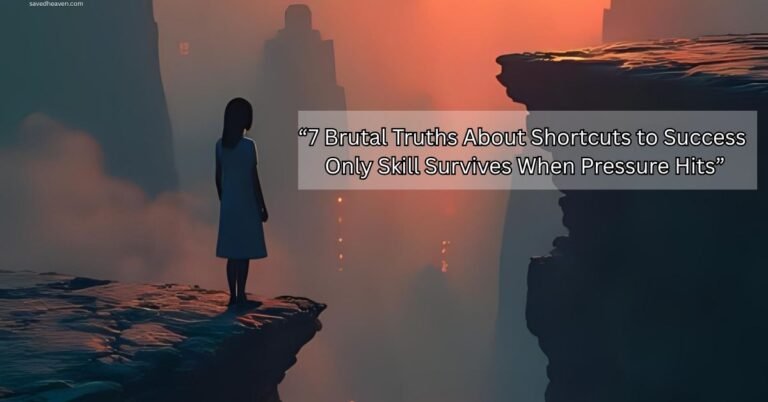Fear to freedom is not just a catchy phrase — it’s a real journey every nation, business, and leader must take. Fear has many outfits. In business it shows up as corruption and gatekeepers. In politics it hides under the weight of “protocols” and intimidation. In poverty it looks like despair that says: “this is just the way life is.”
But courage always looks the same. It doesn’t change costume. It stands its ground.
The truth is this: territorial powers are real. They aren’t fairy tales or harmless shadows. They are systems and strongholds — unseen forces that sit over cities, nations, and families. They monitor growth, resist progress, and intimidate anyone who dares to break cycles of control. The battle is always moving from fear to freedom.
The Illusion of Development vs. the Decay of Foundations
Every nation has two faces. On one side, shining towers, malls, and political slogans promise progress. On the other, you see potholes, abandoned projects, slums, and schools without roofs.
This contrast is not only physical; it’s deeply spiritual. Territorial powers preserve decay as their testimony. They whisper: “This land belongs to us. This vision will not rise again.”
People walk past the ruins and accept them as normal. But they are not normal. They are signs of warfare — a call to rise from fear to freedom.
When Vision Is Blocked
Ever notice how hard it is to see clearly in hostile environments? Businesses with good ideas get shut down. Communities with strong leaders get sabotaged. Nations with rich resources remain poor.
That’s because territorial powers act like police officers of the unseen. They patrol boundaries and stop people from capturing truth. Your “camera” in the spirit is the ability to perceive and record revelation. If they can block your vision, they block your future.
The shift from fear to freedom begins the moment you realize their intimidation is an illusion.
The Formality of Intimidation
When these powers fight, they rarely do it openly. They use formality as a weapon.
In business: endless licenses, corruption, and “fees” that drain startups before they grow.
In politics: traditions, rules, and protocols that favor elites while choking challengers.
In poverty: dependency systems where aid, loans, or conditions keep people kneeling instead of standing.
They love to say: “You don’t belong here. You don’t have the right papers. You didn’t ask permission.”
But heaven does not bow to fake authority. True courage outranks intimidation. Businesses are still born in corrupt economies. Movements still rise in hostile nations. Families still escape poverty against impossible odds. This is what it looks like to move from fear to freedom.
A System Built on Fear
Here’s the secret: these powers aren’t held together by loyalty — only fear.
One enforces punishment while others watch. None rebel. And people behave the same: accepting bad systems because “that’s just how it is.”
But it isn’t. Fear is only powerful if you kneel to it. The moment you stand, you cross the line from fear to freedom.
The Crowd of the Bound
Picture a stadium filled with people — elders, politicians, even church leaders. You expect some to be free, but all kneel under the same punishment.
Why? Because titles don’t break chains. Leadership positions can’t save a man who has surrendered authority to intimidation.
Many who look free are secretly impounded. Their “cars” (movement, destiny) and “phones” (communication, vision) are locked up. They gather as if they belong to freedom, but bow in another court.
This is why whole nations remain poor: they never make the leap from fear to freedom.
Familiar Faces, False Charges
Territorial powers rarely appear as monsters. They use familiar faces — a colleague, a competitor, a neighbor — to bring accusations.
Jealousy. False charges. Distractions.
Why? To keep you fighting small battles while the bigger system still steals your future. That’s why many entrepreneurs never scale, many politicians waste energy on petty wars, and whole societies stay trapped in drama while corruption still rules.
Discernment moves you from fear to freedom.
The Whip and the Authority to Break It
Then comes the whip — punishment, delay, pain, wasted time.
But here’s the revelation: you are not called to accept the whip.
When it rises against you, break it. Don’t negotiate. Don’t bow. In business, that means refusing exploitative contracts. In politics, that means standing even when every system pressures you to kneel. In poverty, that means rejecting the lie that “this is your destiny.”
Once the whip is broken, decree: “Never again.” That’s when you step boldly from fear to freedom.
Why This Matters Now
Today’s powers are subtle. They hide in systems, corruption, and even church structures. They silence vision, intimidate leaders, and drain nations of their best minds.
But here’s the hope: courage never changes. Fear changes costumes; courage doesn’t. The moment you stand your ground, you expose the weakness of every territorial system. That’s the true journey of fear to freedom.
3 Keys to Break Free from Fear Systems
Key 1: Break Fear in Business
Stop letting intimidation set your price, control your contracts, or silence your ideas. Build alliances, innovate, and walk away from oppressive deals.
Key 2: Reclaim Authority in Leadership & Politics
Systems thrive when good men stay silent. Speak. Challenge. Expose. Your voice carries more power than fear wants you to believe.
Key 3: Rise Above Poverty Mindsets
Dependency is the whip of poverty. Refuse to kneel to it. Build, save, skill up, create new models of wealth. This is the leap from fear to freedom.
Final Charge
The world is full of shadows pretending to be wolves. But courage doesn’t change costume. It stands in every system, every office, every marketplace.
The crown is still yours.
Don’t run. Don’t kneel. Don’t negotiate.
Stand — in business, in leadership, in life.
And every territorial power will know: you cannot be broken.
Because at the end of the day, every great story is the same: the brave move from fear to freedom.




